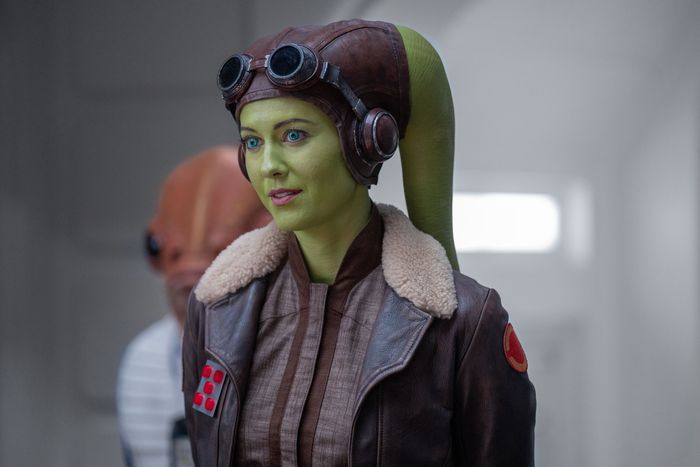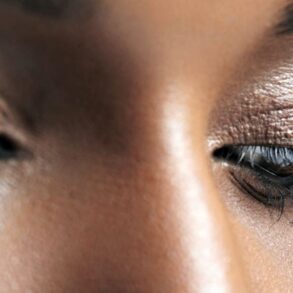
Every single time Hera (Mary Elizabeth Winstead) appears on screen in Ahsoka, my immediate thought is not, “Look at this wonderful alien design,” but rather, “This whole thing is a hat.”
Photo: Suzanne Tenner/Lucasfilm Ltd.
For Star Wars fans who may have only watched the movies and aren’t familiar with the cartoon TV shows that will increasingly form the backbone of the franchise going forward, the new series Ahsoka is eye-opening. One thing it is not, however, is forehead-showing. The show is just the latest example of Star Wars always slapping a hat on one of its most famous alien species, and if you’ll hold off on calling in a wellness check on me, I’ll explain why that’s important — or, at least, annoying.
The mystery forehead in question belongs to Hera Syndulla, a character who made her debut in the Star Wars: Rebels cartoon of which Ahsoka is basically a continuation. She was voiced there by Vanessa Marshall, and she’s played by an all-but-unrecognizable Mary Elizabeth Winstead in the live-action show. Hera, an ace pilot in the Rebel Alliance who went on to become a general in the fledgling New Republic, is a Twi’lek, a species of alien who first appeared in Return of the Jedi who have brightly colored skin and two long fleshy tentacles coming out of their heads instead of hair. In the first few episodes of Ahsoka, as well as all 75 episodes of Rebels (best I can tell), Hera is never seen without her signature aviator’s cap or some other form of headpiece obscuring the base of these head-tails, known as lekku.
Look, I am able to suspend my disbelief and believe I am watching events that took place a long time ago in a galaxy far, far away. But every single time Hera appears on screen — or whenever almost any Twi’lek throughout the entire franchise does — my immediate thought is not, “Look at this wonderful alien from the mind of George Lucas,” but, “This whole thing is a hat.” In live-action, that’s probably because it is, making it easier from a prosthetics and makeup perspective to hide the transition and support the lekku. But even in animation, where the logistics of affixing two hefty tentacles to a real actor’s head aren’t a concern, Hera and the other Twi’lek women are always wearing a hat. Aside from some body paint, these tendrils are the one thing that makes Twi’leks aliens instead of humans, and in almost every instance the dividing line between what makes them a human and what makes them a fantastical alien is obscured by some sort of headgear. It’s easy to spot where the living creature ends and artificiality begins. It’s a step below the “rubber forehead alien” trope, where many a Star Trek alien is just a wrinkled prosthetic forehead away from being a normal human. Twi’leks are rubber-headband aliens.
Twi’lek — or at least female Twi’lek — have been this way from the very beginning. Return of the Jedi featured two examples of the species. One was Oola, a slave at Jabba’s palace who wore a headpiece that was very clearly helping to hold the prosthetics on actress Femi Taylor’s head while she danced around and eventually got eaten by a Rancor. The other was Bib Fortuna, a male Twi’liek who was one of Jabba the Hutt’s key lackeys. Bib Fortuna does not wear a headpiece because male Twi’liek are pretty ugly compared to their opposite-sex counterparts, as female Twi’liek are consistently some of the most sexualized and conventionally attractive characters in the entire franchise, both in canon and in the (occasionally gross) fandom. Bib’s got weird bulbous growths on his forehead, part of a more elaborate and all-encompassing bit of makeup, with the final effect of making him look much more alien than Oola.
This is perhaps the original sin of Twi’lek design. Because Twi’lek women needed to be hot, their alienness was an accessory — and the constant wearing of literal accessories like hats and headbands makes the lekku read as a one as well. Twi’lek characters in later Star Wars installments were eventually less sexualized. Aayla Secura from the prequel trilogy wears pretty revealing clothes for a Jedi, but Hera’s creators, Henry Gilroy and Dave Filoni, partially created her to be an example of a less-sexualized Twi’lek, as Gilroy explained during a podcast interview.
Gilroy and Filoni’s admirable mission was accomplished, but in all her appearances Hera’s wearing some type of cap. She’s not unique in this regard, as with the notable exception of Darth Talon — a red-skinned Sith Twi’lek from non-canon comics and video games who has never been depicted in a movie or show — basically every female Twi’lek in the series has a chapeau. Even some male Twi’lek, as seen in The Mandalorian, have their heads wrapped up.
If there’s a canon explanation for why, in the fiction of Star Wars, girl Twi’leks wear headgear, it’s obscure enough to not be noted on Wookiepedia, the terrifyingly extensive Star Wars fan resource. There is an unsourced explanation from the noncanonical “Legends” part of the site, which states that many Twi’lek slaves were forced to wear headgear because it prevented them from communicating in their native language, which involves subtle movements of their lekku. That’s deeply messed up and would make the widespread voluntary wearing of hats even more baffling.
And so, with no explanation, pretty much every Twi’lek we see wears some sort of hat. The same is true of Ahsoka’s species, Togruta, who frequently wear a headband exactly covering up where their face transitions to the elaborate crown-like horns and tendrils. Perhaps even more so, as whatever’s going on with her head isn’t the same color as her orange skin, making it even easier to mistake the whole thing for a hat.
Is the lack of alien foreheads really the biggest problem facing Star Wars right now? No, of course not. I saw Rise of Skywalker and Book of Boba Fett — the franchise has bigger issues. But I’m hung up on it because it’s a small detail that prevents the Star Wars galaxy from feeling like a real place. It’s not just because the shows are hiding the seams of the makeup. Practical effects are great! It’s that Star Wars frequently feels too small: Everyone’s a Jedi or at least knows of one, Mandalorians are ubiquitous, and a Skywalker could appear at any moment. The same plots of rebellion happen over and over again so there’s no sense of real change. And so when every single Twi’lek just wears a hat no matter what the circumstance is because that’s just the character model or something? Why, that’s just bone-headed.
This post was originally published on this site be sure to check out more of their content.








